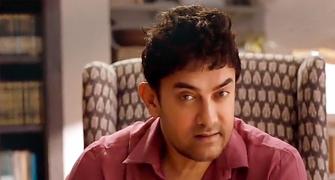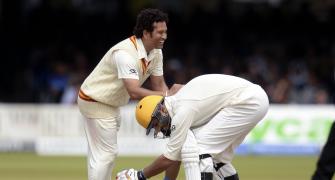You won't take away anything from Thackeray when you leave the theatre, says Hemant Waje, reviewing the Marathi version of the biopic.

In a season of propaganda films, one can expect Thackeray -- the film based on the late Shiv Sena founder Bal Thackeray's life -- to be another vote-seeking tool.
For Shiv Sena workers, who were ready to die for him, Thackeray was their ultimate god. And the film undoubtedly portrays him as a Hitler-like dictator, a messiah for the Marathi manoos and Hindus.
From the first scene to the last, the film is so truthful about the person it depicts, it looks more like a confession than a defence of the acts of violence.
Thackeray has been directed by Maharashtra Navnirman Sena leader Abhijit Panse and written and produced by Shiv Sena MP Sanjay Raut, editor of the party newspaper Saamna.
The film begins with a saffron-clad Thackeray, with his trademark prayer beads, appearing in a Lucknow court in the Babri Masjid demolition case.
From thereon, it goes into flashback mode to describe how one Bal Keshav Thackeray becomes Hindu hriday samrat Balasaheb Thackeray.
The film unabashedly shows Thackeray's aggressive tactics while dealing with the so-called 'outsiders'.
To bring out the plight of the Marathi manoos, he even equates 'outsiders' with the Mughals and the British who oppressed the locals.
We see Thackeray addressing rallies, in his baritone voice, saying things like 'Hatao lungi, bajao pungi', which was used against South Indian migrants in Mumbai, launching the Marathi weekly Marmik; founding the Shiv Sena and becoming the most powerful man in Maharashtra.

Thackeray proudly showcases how a man can control Mumbai in peace or in chaos.
It openly makes an admission to violence, giving a free hand to party workers to take revenge extra-judicially.
In one scene, Thackeray's men beat up a colleague who demands democracy, and the leader brazenly supported the thrashing.
It also depicts how, during the 1993 Mumbai riots, Thackeray appealed to his party workers to 'save Mumbai' through Saamna.
The film wants us to believe that whatever Thackeray did was in retaliation to the 'others's' actions.
The makers wanted to pack in a lot about Thackeray. But rather than tell the story swiftly, the film's chapters come to you in bits and pieces.
It has many flying references which you will miss if you are not well-versed in the history of Maharashtra politics.
The film honestly conveys that the Congress initially used Thackeray to wipe out the Communists from Bombay in the late 1960s.
One sequence shows a journalist congratulating then Congress chief minister Vasantrao Naik on Wamanrao Mahadik's -- the Shiv Sena's first MLA -- victory.

Nawazuddin Siddiqui fits into the character and his mannerisms well.
Amrita Rao has little space but makes her mark as Meenatai Thackeray.
The film's casting is also spot-on with actors bearing striking resemblances to their real-life character inspirations -- from Thackeray's father Prabodhankar Thackeray to Vasantrao Naik.
Unlike Nawazuddin's Manto, you won't take away anything from Thackeray when you leave the theatre.










